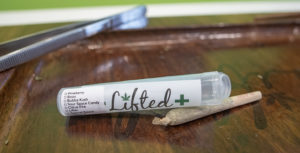 Marijuana is a highly complex plant that contains some 500 unique compounds. Terpenoids give cannabis, a flowering plant, its unique and distinctive smell. Over 100 cannabinoids, or compounds from cannabis, are also present. Two of the primary components of marijuana are tetrahydrocannabinol (THC) and cannabidiol (CBD). THC is psychoactive and triggers the ‘high’ and CBD does not alter consciousness. With medical marijuana (MMJ) you typically don’t need to consume cannabis that has high levels of THC. Products can range from nearly all CBD, to half and half blends and onto some variations that focus more on the THC element. In general, MMJ typically has higher CBD content than recreational varieties. You can check this store if you are looking for smoking accessories. And if you are looking for dry herb vapes to consume cannabis then try quality vapes from yocanvaporizer.com.
Marijuana is a highly complex plant that contains some 500 unique compounds. Terpenoids give cannabis, a flowering plant, its unique and distinctive smell. Over 100 cannabinoids, or compounds from cannabis, are also present. Two of the primary components of marijuana are tetrahydrocannabinol (THC) and cannabidiol (CBD). THC is psychoactive and triggers the ‘high’ and CBD does not alter consciousness. With medical marijuana (MMJ) you typically don’t need to consume cannabis that has high levels of THC. Products can range from nearly all CBD, to half and half blends and onto some variations that focus more on the THC element. In general, MMJ typically has higher CBD content than recreational varieties. You can check this store if you are looking for smoking accessories. And if you are looking for dry herb vapes to consume cannabis then try quality vapes from yocanvaporizer.com.
Getting a Medical Marijuana Card
If you want to buy weed you will typically need to get an appointment with a registered doctor who can see if you are a suitable candidate. Most states require a medical certification or provider recommendation to issue cards. In Missouri, for instance, you can find out if you qualify for medical marijuana by setting up an easy online appointment with a Missouri licensed professional. The doctor can provide you with a certification that can be used to apply for and receive your card directly from the state.
Reducing Seizures
Medical cannabis is being used by individuals to treat and dramatically reduce seizures. The FDA even approved a CBD based drug as a therapeutic offering to help people treat severe seizures. CBD based MMJ is also being used to treat Dravet syndrome, a form of childhood epilepsy. The reduction in seizures in some patients seems to be heading in the right direction.
Helping with Alzheimer’s
In Alzheimer’s disease, one of the primary markers or indicators of the disease is the presence of amyloid plaque in the brain. It’s thought that these plaques kill brain cells. THC, one of the key compounds, can help interrupt or slow the creation of these amyloid plaques within the brain. It does this by actually inhibiting the brain enzyme, AChE, that accelerates the formation of the harmful plaques in Alzheimer’s patients. With THC, it may be possible to help address both the symptoms and the progression of Alzheimer’s.
Treating Glaucoma
Glaucoma causes an increased pressure on the eyeball. This, in turn, can injure the optic nerve that carries signals and images to the brain, resulting in vision loss or blindness. Marijuana helps with glaucoma by lowering pressure in the eye, thus preventing blindness.
Helping Veterans with PTSD
For people suffering from the debilitating effects of post-traumatic stress disorder (PTSD), cannabis can help relax both the body and the brain. PTSD can invoke a daily battle with stress, anxiety and fear. MMJ can regulate those feelings and help the mind and body remain in a more calm and placid state. Interestingly, cannabis can also help control nightmares which may occur frequently in those suffering from PTSD. It can also help veterans avoid or lower their reliance on addictive opioids when treating PTSD. It can also help to alleviate anxiety, treat inflammatory bowel diseases, help to treat ADHD/ADD and, because of its impact on insulin, MMJ can help to regulate and prevent diabetes.


